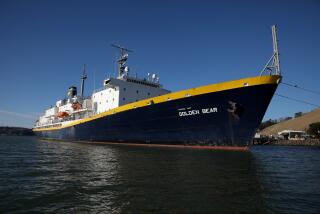State Maritime School Cruise Might Have Violated Laws
- Share via
SACRAMENTO — Officials of the California Maritime Academy may have violated federal and state laws by taking fee-paying passengers on a 10-day cruise to Canada’s Expo ’86 to attend a promotion of California wines and cheeses, the state auditor general said Wednesday.
In response, J. J. Ekelund, president of the state-operated academy which trains deck and engineering officers for the merchant marine, denied any impropriety and said federal authorities had approved taking the passengers along.
In a report to the Legislature, Auditor General Thomas W. Hayes said the U.S. Coast Guard is “conducting a complete investigation” to learn whether academy officials violated maritime laws by using the training ship Golden Bear to carry 255 passengers who paid a fee of $150 each.
Hayes also said a “profit” of $25,600 was made on the venture by the California Maritime Academy Foundation--a private, nonprofit group organized to financially support programs of the four-year college. The foundation sponsored the passenger cruise to raise funds.
Friends and Families
Investigators at the Coast Guard’s Marine Safety Office in San Francisco were reported unavailable for comment Wednesday. Ekelund said through an academy spokesman that he was unaware of any Coast Guard investigation.
Hayes said the “unauthorized” passengers paid the fee and took the cruise to Vancouver, Canada, as part of a major promotion of California agricultural products at the exposition.
Current and former Administration officials said they believed that no state officials or other VIPs were aboard the Golden Bear cruise, July 6-Aug. 6, 1986. Ekelund said the passengers chiefly were friends and relatives of academy staff members and students. The crew included 130 faculty members and midshipmen.
Hayes said it appeared that use of the federally owned Golden Bear to carry passengers constituted an illegal use of government property. He said that the 48-year-old converted World War II troopship is intended for training midshipmen and that its certificate of inspection “states that the ship may carry no passengers.”
Based on a legal opinion by the Legislature’s lawyer, Hayes said that allowing the foundation to use the ship for profit may also have been a violation of state law.
The foundation’s president, Capt. John M. Keever, is also deputy president of the academy and commander of the training ship.
The academy, which grants bachelor of science degrees to its graduates, was created in 1929, is based at Vallejo and has an enrollment of about 400 students. The academy is governed by a board appointed by the governor.
Hayes charged that neither Ekelund nor Keever had “informed federal officials or the academy’s board of governors that the foundation would have fee-paying passengers on the cruise.”
‘Ideal Opportunity’
In a written response, Ekelund defended the cruise as “an ideal opportunity to gain additional training for our students” and the trip was “made with the feeling” that it was consistent with the training purpose of the ship.
He maintained that the academy governors approved the trip. Although minutes of the board’s March, 1986, meeting show that the trip was approved, no mention was made of any passengers. Likewise, he noted that the Maritime Administration asked the State Department to make necessary diplomatic clearance for the Golden Bear. But passengers were not mentioned in that request either.
Ekelund said through academy spokesman Tom Kilpatrick on Wednesday that he “certainly did” inform the Coast Guard that the ship would be carrying fee-paying passengers. “We did receive Coast Guard approval to do what we did,” Kilpatrick said.
In his written response to Hayes, Ekelund likened the cruise to good-will “familiarization” cruises the Navy sponsors for civilians and military families.
He said the $150 charge by the private foundation was to avoid any indication that passenger costs were being paid by the taxpayers. The fee, he said, applied to such costs as food and services for 10 days and not as fare for passage or room rent because passengers occupied already available space and they added no extra costs for transportation.
Hayes said the opinion by the Legislature’s lawyer held that if it is determined that the Golden Bear was used as a passenger vessel, Ekelund, Keever and members of the board of governors could be subject to a $5,000 civil fine.
He said, additionally, that each passenger on the ship could recover the cost of passage and $100 for each passenger in excess of the legal number the ship is certified to carry. In the Golden Bear’s case, Hayes said, no passengers were legal.
More to Read
Sign up for Essential California
The most important California stories and recommendations in your inbox every morning.
You may occasionally receive promotional content from the Los Angeles Times.













